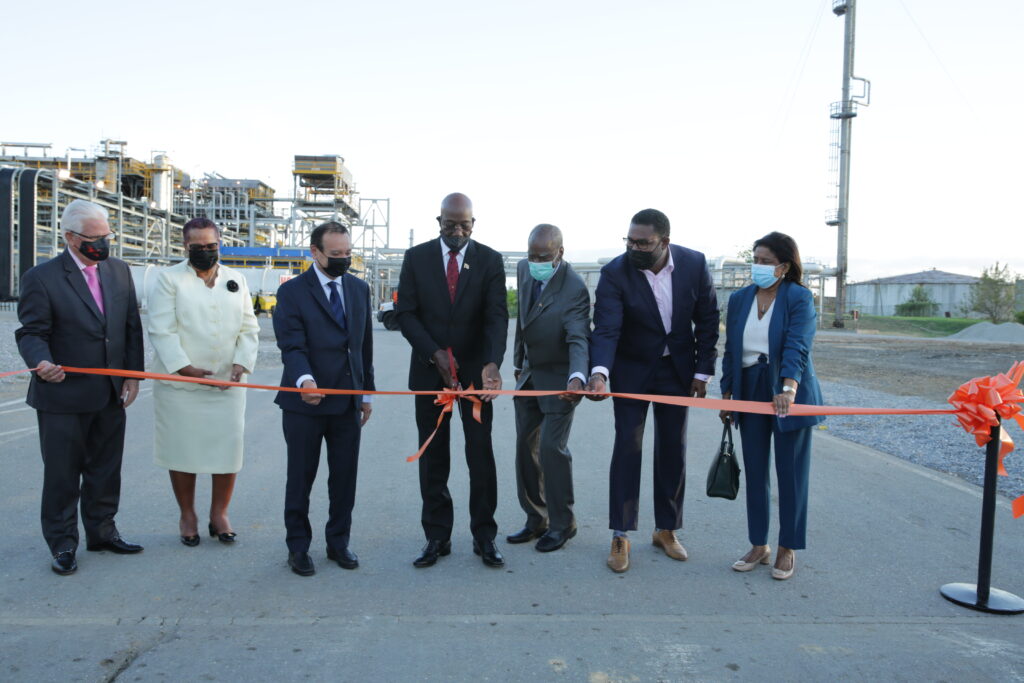- 08 MAR 2021
Prime Minister Rowley’s Statement at The Opening of NIQUAN Gas to Liquids Plant.

It gives me great pleasure and a sense of satisfaction to be here today to commemorate the start-up of this country’s first Gas-to-Liquids plant. I extend my heartfelt congratulations to all of the teams involved in making this project a reality, from the executive teams at NiQuan, the Trinidad and Tobago Upstream Downstream Energy Operations Company Limited and the Ministry of Energy and Energy Industries, to the financiers and contractors, each of whom played unique and indispensable roles in getting us to this point.
Ladies and gentlemen, before I begin, I want to address the background of this particular plant. I am certain that most, if not all of you here today are aware of the long and, at times, tumultuous history of this plant. We cannot ignore this history or pretend that the situation was different from what it is. We, as a Government, do not see the world through rose-coloured lenses. Throughout our tenure thus far, we have demonstrated pragmatism and transparency, time and time again as we tackle and solve specific individual problems. In order to do so we have to first acknowledge the reality of difficult, unsatisfactory and unfavourable circumstances, and address them accordingly, as the situation requires.
I have said before that the internal management of the project by Petrotrin and WGTL was an undeniable failure, and this remains true. However, fortunately for this gas-to-liquids plant, the Petrotrin and WGTL failure was not the end of the road. The Government set out to make the best of a situation over which we had little control in the past.
Recognizing the NiQuan project as an opportunity for the country to gain some benefit from an investment which otherwise could not have been operationalized, the Government facilitated this project by sourcing and securing a supply of gas to the plant, to a maximum of 31 mmscf per day, through the Trinidad and Tobago Upstream Downstream Energy Operations Company Limited. The Minister of Energy and Energy Industries has already expanded on this in some detail.
When we say here today that this Gas-to-Liquids plant is a success, people may ask what is successful about a plant that started construction in 2007 and has only just now been completed in 2021? What is there to commemorate about a project that was once plagued by delays and cost overruns? So let me briefly outline the victories of NiQuan and this gas-to-liquids plant.
If the project was written off as a failed attempt, as was the case before this initiative, there was nothing to be had except permanent financial losses, finger-pointing and political grandstanding.
Thankfully there was another option.
I will begin with the financial benefits. In 2018 when NiQuan acquired the plant, Petrotrin received a cash payment of US$10 million, with the remaining US$25 million to be paid in Preference Shares. To complete the plant, a further capital injection of approximately US$125 million was required.
Additionally, the Government is expected to receive TT$2 billion in taxes and statutory payments over the life of the project. NiQuan’s investment represents the first major private investment in the downstream energy sector in recent times, despite difficulties in the global markets.
Equally important was this Government’s ability to recognize when to take a step back and allow private investors to step up, which is what we are currently doing with the Guaracara Refinery. This approach is in keeping with Theme IV of our National Development Strategy: Building Globally Competitive Businesses.
While we will continue to provide support and make interventions where necessary, in forms that we, as the Government, deem appropriate, we must also know when to adopt a hands-off approach to allow private investors the opportunity to flourish, especially where the state has tried and failed.
This gas-to-liquids plant is a prime example of the successful development of the country’s export potential of higher value-added products, through the collaboration of the private sector, the banking sector and the Government. This is the manner of collaboration that is necessary to stimulate activity within our economy, and to aid in the country’s post-pandemic recovery.
NiQuan performed creditably, and successfully completed and commissioned this GTL plant, through partnership with highly experienced experts, such as BD Energy Systems, Black and Veatch Management Consulting, Halder Topsoe and Emerging Fuels Technology, who are two of the world’s primary authorities in GTL technology, and last but not least, our very own Junior Sammy Contractors Ltd. I understand that these partnerships were key in de-risking the project and would have contributed to NiQuan receiving its third consecutive A+ rating from CariCRIS.
Today, with the start-up of the first commercial scale GTL plant in the Western Hemisphere, NiQuan and Trinidad and Tobago join the likes of Shell, the Chevron Corporation, Petro SA in South Africa and Oryx GTL in Qatar, as GTL producers.
We are diversifying our current product slate through the addition of NiQuan’s GTL diesel and GTL fuel, and stepping into a global market that is expected to grow at a Compound Annual Growth Rate (CAGR) of 7.5% over the period 2020 to 2025. The plant’s products, in particular the zero sulphur diesel, provide an excellent opportunity to monetize our natural gas resources through clean and environmentally friendly channels, while creating value right here in Trinidad.
Against a backdrop of a world that is rapidly transitioning to cleaner sources of fuel, zero sulphur diesel is a welcome addition to the range of products originating from Trinidad and Tobago, especially in light of developments such as the IMO’s stricter sulphur regulations that came into effect in January 2020. As countries and organizations alike chart an accelerated course for a cleaner future, our product offerings must reflect the changing appetites of the energy markets.
Another success of this project was NiQuan’s management of the challenges presented by the COVID-19 pandemic. I understand that, like almost all other projects, both upstream and downstream, this project was not immune to effects of the COVID-19 pandemic. I am sure that representatives from NiQuan can expound on the impact of the implementation of new public health regulations, which would have limited the number of people on site; caused delays or limitations in the receipt of expatriate technical support due to travel restrictions; and disruptions in the global supply chain. I must commend NiQuan for endeavouring to source locally available alternatives and to mitigate delays in procurement.
So, ladies and gentlemen, when we label this project a success, it is not because we are ignorant of its history, but rather because we are acutely aware of it. It was not an insignificant task to turn what others viewed only as scrap metal into a revenue stream, an avenue to earn foreign exchange, and a source of employment for many of our citizens.
The 700 plus persons employed during the construction, the 65 skilled workers who will be permanently employed, and the additional 650 persons who are indirectly a part of the supply chain would have already gained some benefit from the economic activity spurred by NiQuan in the completion of this plant. I can hardly imagine that any of them would view this project as anything but a triumph.
Once again, let me congratulate NiQuan and all parties involved in seeing this project through to completion. It is certainly noteworthy that you stayed the course and remained persistent, even when the outcome appeared to be threatened by the pandemic and the resulting severe and unprecedented decrease in energy prices. However, as we expected, and as we have already begun to see, the pandemic will not last forever, and neither will depressed demand and prices. NiQuan, and the rest of the country, will be well poised to ride the waves of recovery as they come.
I wish NiQuan the greatest success in its future operations, because the success of NiQuan redounds to this country’s benefit and that of all its citizens. We eagerly anticipate news of your first product shipment and we hope that you may have many more milestones to commemorate in the years ahead.
Niquan has led the way out of what some called a junkyard, using a good business plan, superb expertise, cooperation and determination. As the state has successfully restructured Petrotrin, at this very location, it has left similar openings for the private sector, using the same attributes, to find opportunities to revive the existing suite of equipment which are available here. In the coming weeks the Guaracara refinery will be put out for interested proposals and we await the outcome of any successful accompaniment to Niquan at historic Point a Pierre.
Ladies and gentlemen, I thank you very much for your attention and as we continue to make our way out of a very difficult era of pandemic and economic challenges, I wish you a safe and enjoyable afternoon and may God continue to bless Trinidad and Tobago.





